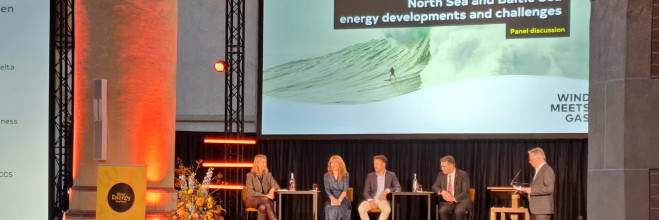The Freeport of Ventspils in the Netherlands learns new developments in the hydrogen economy sector

The Freeport of Ventspils Authority continues to be active in the renewable energy sector, learning from the techniques of other countries. At the beginning of October, Kaspars Liepiņš, the developer of the renewable energy cluster of the Freeport of Ventspils Authority, participated in the event “Hydrogen Trade Mission to the Netherlands - Building renewable and low-carbon Hydrogen Ecosystems” taking place in the Netherlands. The representative of the Freeport of Ventspils Authority earned valuable knowledge from the most progressive accomplishments in the sector of green energy, and the expertise gained will be used in Ventspils on its way to developing the hydrogen energy ecosystem.
During the visit, the participants engaged in educational talks about the latest developments in the field of hydrogen (H2) in Europe, a panel discussion on learning and national cooperation in the creation of hydrogen ecosystems, as well as a plenary session on the North Sea and Baltic Sea energy plans, purposes, development, and challenges. The event focused heavily on the development and business potential of the hydrogen economy sector in the Baltic States and Poland, as the Netherlands conducted a thorough market analysis in 2023 to learn how these four countries can learn and collaborate to form renewable and low-carbon hydrogen ecosystems.
The guests visited the Port of Amsterdam, which, together with a consortium of multinational partners, is currently developing a green hydrogen and its derivatives value chain. The participants also had the chance to see the Hydrogen Laboratory of the Arnhem and Nijmegen (HAN) University of Applied Sciences. An important attraction was the Kleefse Waard Industrial Park, a prize-winning business park that links sustainable and energy-related companies with a focus on innovative industrial movements.
The plenary session examined how developing a complete H2 value chain in the Netherlands and its eastern region is influenced by finance, knowledge, human capital, regulatory framework, and public-private partnerships. A special focus was put on the ambitions and challenges of offshore energy expansion. The overall theme of the international conference “Wind meets Gas” this year was concentrated on the implementation of large-scale energy projects, the main barriers, and facilitators. Attendees at the conference shared their nations’ practices in the fields of hydrogen and other sustainable energy technologies, with a focus on the energy potential of the North Sea coast. Like the North Sea, the Baltic Sea also has sumptuous potential for increasing offshore wind power and decreasing reliance on fossil energy sources. The panel discussion focused on the significance of transnational cooperation and the key enablers and obstacles to achieving goals and implementing these large-scale energy projects.
The trade mission was organized by the Embassy of the Netherlands in Latvia and the Netherlands Enterprise Agency (RvO – Rijksdienst voor Ondernemend Nederland). The goal of the visit was to express the interests of the Freeport of Ventspils to establish connections and encourage partnerships between various representatives of the industry in Europe in connection with the attraction of investments for Green energy and hydrogen economy projects, as well as to design a Green transformation strategy. The port of Ventspils as an infrastructure object has enormous potential to be included in the hydrogen ecosystem and to adjust to the development of the future hydrogen economy, including exporting the produced hydrogen abroad. The strategic emphasis on hydrogen could reinforce the position of Ventspils as a center for sustainable energy solutions in the Baltic region.